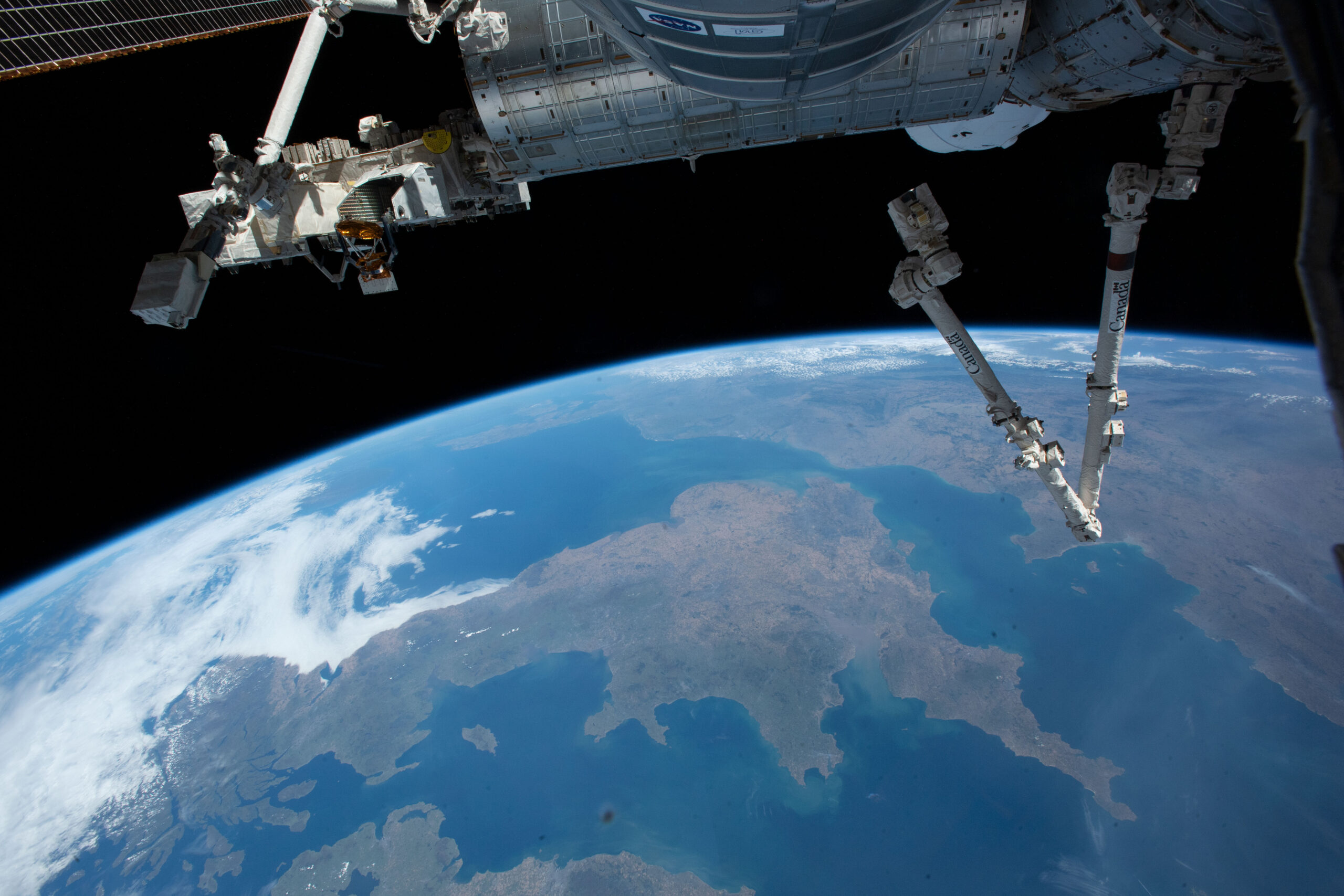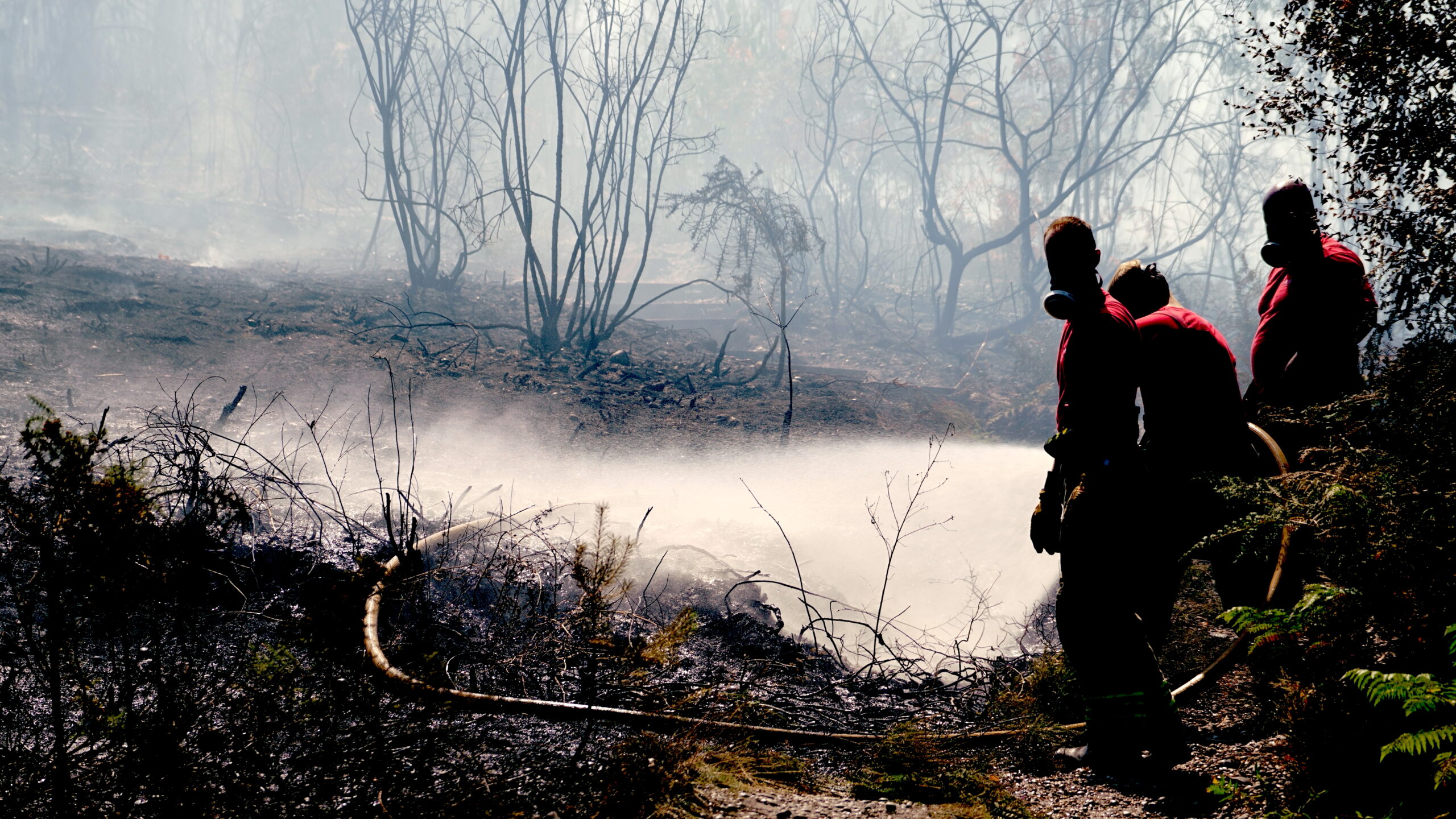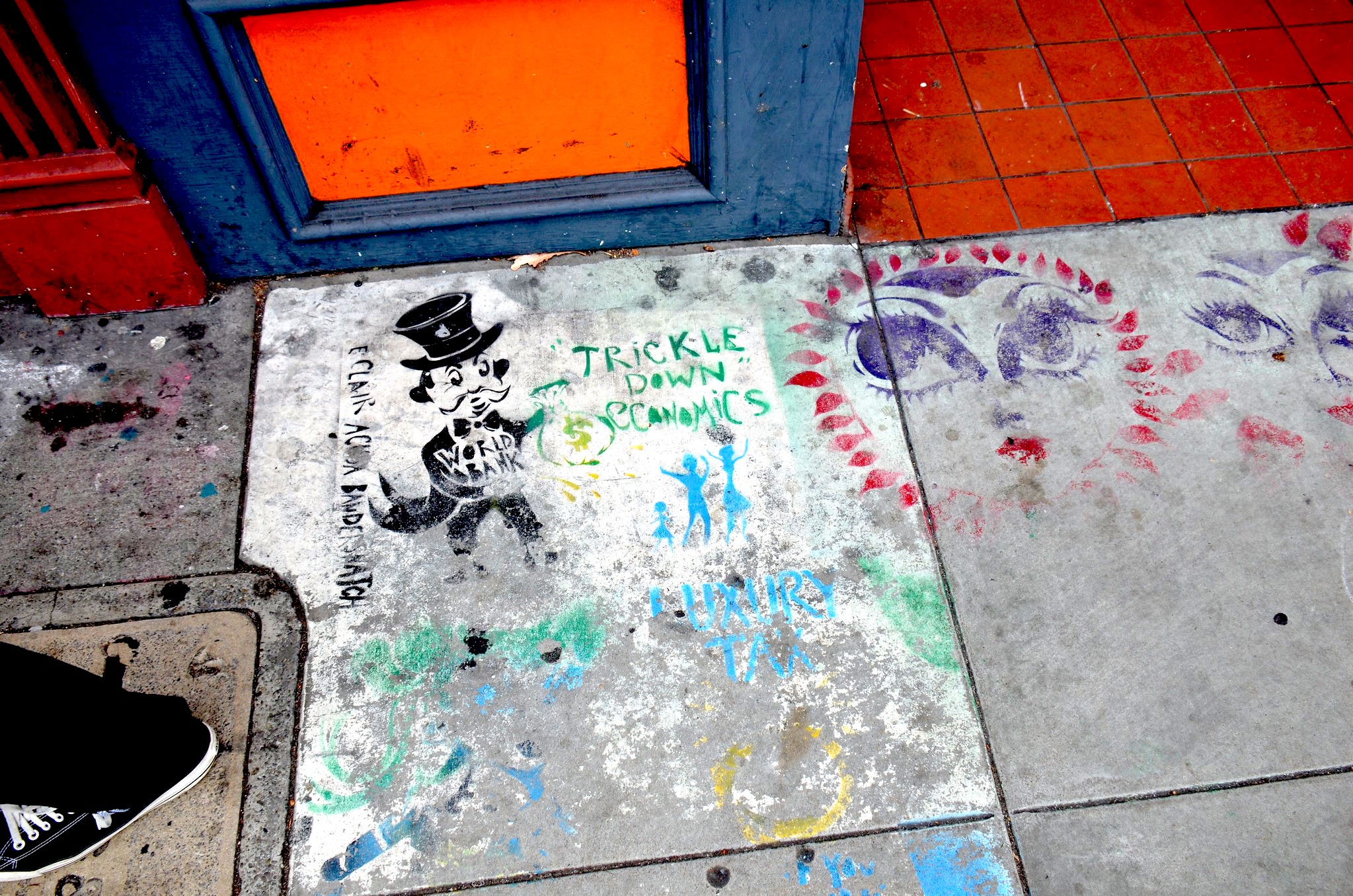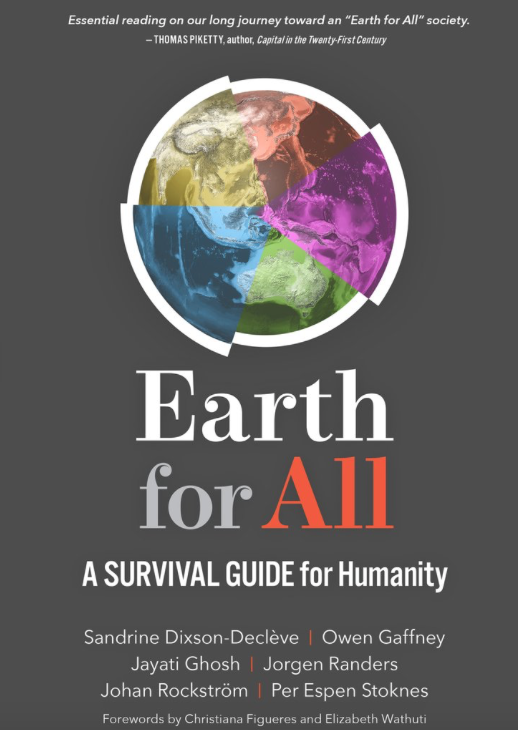Kate Pickett touts the Club of Rome’s “Earth4All” prescription for a root-and-branch reshaping of the economy, away from neoliberal, extractive capitalism.

Great Britain, from the International Space Station, Aug. 12. (NASA, Wikimedia Commons)
By Kate Pickett
International Politics and Society and IPS-Journa
 It is a feeling of outrage, with a strong sense of déjà-vu. From the vantage point in the United Kingdom — where inequality and social injustice are in particularly sharp focus — we’re on the brink of yet another social and economic crisis. Even more so than in the rest of Europe, energy prices, and the cost of living are rocketing.
It is a feeling of outrage, with a strong sense of déjà-vu. From the vantage point in the United Kingdom — where inequality and social injustice are in particularly sharp focus — we’re on the brink of yet another social and economic crisis. Even more so than in the rest of Europe, energy prices, and the cost of living are rocketing.
But what is happening at the top? What are our leaders doing? Why are some people, yet again, making eye-watering financial gains while others face destitution and a real fear of being cold and hungry this winter?
The image springs to mind of Nero fiddling while Rome burns — a depraved, corrupt, and wildly unpopular emperor, blithely playing music while the populace suffers and failing through inertia to provide any leadership in a crisis. On a wider canvas, it encapsulates the inadequacies of so many political leaders over recent years, from the global financial crisis to the pandemic, in the face of the climate emergency and now the spiralling cost of living.
I thought as a child the “fiddling” Nero was doing was related to the other English meaning of the word — obtaining money dishonestly, by embezzlement or corruption. I mistakenly assumed he had raided the imperial treasury and made off with his ill-gotten gold.
It turns out the youthful misconception is now the right metaphor of how business figures and investors have profited from the hardship of others. And that provokes even more moral outrage than the passive failures of hapless political leaders.

On July 19, the hottest day on record in the U.K., fire fighters had to tackle a major fire on Shirley Hills, near Croydon in Great Britain. (Peter Trimming, CC BY-SA 2.0, Wikimedia Commons)
Rich Getting Richer on Backs of the Poor
Look at who suffered from the global financial crisis. It wasn’t the rich, who had caused the problem through unscrupulous financial practices. It was the rest of us who paid the price, as average real incomes declined — and the poorest who suffered the most, with the lowest-paid workers seeing the steepest falls in wages.
Meanwhile, the pay of top chief executives shot up. In the years following the crash, the world’s richest 1 per cent increased their wealth until they owned more than the bottom half of the world’s entire population.
Top investors made billions by buying up shares in failing banks and betting against housing markets that were foreclosing on the mortgages of the poor, realising massive gains during recovery. The 19th-century British financier Nathan Rothschild is credited with the invocation that “the time to buy is when there’s blood in the streets” — a horrendously cynical phrase which at least recognises the deep immorality involved.
It has been just the same during the pandemic, with the poorest the most likely to be exposed to the coronavirus, to be infected, to become really ill and to die. Death rates have been twice as high in the most deprived areas of the U.K. as in the most affluent neighbourhoods, a pattern repeated across the world.
Poor workers couldn’t afford to protect themselves from exposure, small businesses went to the wall and household precarity and financial insecurity increased. At the same time, the rich were not only able to keep themselves safe from infection but were also accumulating wealth — including in Britain from government procurement schemes set up under emergency regulations with lowered scrutiny for corruption. The world’s billionaires saw their wealth increase by nearly 70 per cent during the pandemic.
‘Trickle Down’ Myth

“Trickle down economics” by Eclair Acuda Bandersnatch. (Steve Rhodes, Flickr, CC BY-NC-ND 2.0)
During this summer of severe drought across Europe, it became clear that huge remuneration packages and dividends had enriched the chief executives and shareholders of the U.K.’s water companies.
Previously treated as a public good, water was privatised when Margaret Thatcher was in power. This despite their abysmal record on tackling leaks and pollution and investing in new reservoirs and infrastructure.
Although most of the firms were failing to meet sewage pollution targets, bonuses paid to water company executives rose by 20 percent in 2021 — on average they received extra payments of well over €100,000. Some further rake it in from second jobs on the boards of other companies, where they set the pay and bonuses of other top executives.
Donate to CN’s 2022 Fall Fund Drive
We know who is suffering most from rising prices and interest rates in this cost-of-living crisis: those on low incomes, on benefits, families with children, especially lone parents and everyone living in deprived areas.
Already we can read stories in Britain of people eating cold food because they cannot afford the energy needed to run their ovens and microwaves, of key workers in the health service calling in sick because they cannot afford petrol to get to work and of people planning to turn off their heating in the winter.
Yet oil and gas companies have made huge profits since the energy crisis began and their chief executives continue to be paid millions — some many millions. Throughout each of these social and economic disasters, it hasn’t simply been a matter of the poor getting poorer and the rich getting somewhat richer. In these big existential crises, the rich have got a lot richer.
 If it’s such a familiar pattern, why do we tolerate it? We’ve surely known for long enough that when the rich get richer it doesn’t “trickle down.”
If it’s such a familiar pattern, why do we tolerate it? We’ve surely known for long enough that when the rich get richer it doesn’t “trickle down.”
There is a cartoon which shows two skeletons sitting in a boat, labelled “99 per cent,” on the seabed. One skeleton says: “They say a rising tide lifts all boats.” The other replies: “Do they say when?”
There are many policy options: imposing windfall taxes on profits, nationalising energy and water companies, linking bonus payments to improvements in service and sustainability, and more. But these are a bandage on a gaping wound. The problems are persistent across time and across sectors.
What is needed is a root-and-branch reshaping of our economy, away from neoliberal, extractive capitalism and towards a system built on the “new economics” — more communitarian, egalitarian and democratic, with sustainability and wellbeing as its goals.
This month, 50 years on from its ground-breaking Limits to Growth, the Club of Rome is issuing Earth4All, the result of a two-year research programme by a collective of economic thinkers, scientists and activists of which I have been part. It calls for five extraordinary turnarounds — of poverty, inequality, gender empowerment, food, and energy — to create a better future.
Check out Earth4All’s website. A safe, secure and prosperous future for all on a healthy planet is imperative.
Kate Pickett is the deputy director of the Centre for Future Health and associate director of the Leverhulme Centre for Anthropocene Biodiversity at the University of York.
This is a joint publication by Social Europe and IPS-Journa
The views expressed are solely those of the author and may or may not reflect those of Consortium News.
Donate Today to CN’s
2022 Fall Fund Drive
Donate securely by credit card or check by clicking the red button:

The likes of Vanguard & Blackrock are now too big and too powerful to be stopped, they will soon own almost everything (they already own most of the corporate media) and are diversifying into everything from Student Accomodation to food production.
The way they and Private Equity are able to do this is the crux of the problem, they can but up assets without any capital interest free, pay next to zero tax, asset strip the purchased entity whilst loading it up with debt that is then used to offset more taxes.
This was designed by the plutocrats, for the plutocrats and is utterly immoral.
That world we saw in the original Blade Runner movie of 1982 where a handful of corporations own everything? It’s already here.
All thanks to the likes of Hayak, Rand, Friedman et al and the Chicago School
These lucifers should have been drowned at birth
You know Pres Biden recently said something like “trickle down does not happen”. So that’s good, right?
Ronnie RayGun was such a sellout…
While I agree that a fundamental transformation of so-called capitalism is necessary, looking to the Club of Rome is problematic at best. A different flavor of capitalism is not going to work, given the nature of capitalism, finance and the current structures of power.
If you have an interest in economics, I strongly recommend reading the new book by prof. Michael Hudson, The Destiny of Civilization: Industrial Capitalism, Finance Capitalism or Socialism? Hudson is arguably the most accurate economist of the last 50 plus years – his track record speaks for itself. His books do require a basic knowledge of economics and economics terms, but the work is not overly technical and includes loads of historical context. Other economists to look into are prof. Jack Rasmus, and prof. Richard Wolff.
Chris Hedges, Pepe Escobar, Ben Norton, CN Live! and others have interviewed Hudson. Many people not familiar with economic history, macro economics, and economic theory might not fully grasp what Hudson writes, but the interviews break it down and can be easily be found online.
I almost forgot: Thank you CN Live! for interviewing Michael Hudson!
For the rich, who are the epitome of selfishness, I have nothing but contempt. If there is a hell…this is where they belong.
“What is needed is a root-and-branch reshaping of our economy, away from neoliberal, extractive capitalism…”
How?
The capitalists are the imperial government, it is they who control policy, and who have a history of toppling nations, starting wars, committing genocide, and generally brutalizing anyone who opposes their wealth/power addiction.
Even when the end of human life on this world is a looming threat, resulting from their practices, they refuse to change. Every avenue of systemic, structural change has been shut down, and each new one we create is crushed. We know how to avoid this trajectory of horror, but the first step is to remove the power of those who would risk us all in their game of acquisition. Their power comes from their wealth, and because they refuse to utilize it responsibly, it must be expropriated. No person should have so much power that it causes such vicious sickness of the mind.
Again though… how? These people invade nations and kill millions for profit, are immune to the rule of law, dominate most information systems, and we’ve spent decades asking nicely. I don’t know how to fight people who are capable of making industrialized mass murder for profit seem patriotic.
A truly huge problem as you describe it correctly.
But hopefully Earth4All takes that into account.
A growing consciousness of the people regarding the root problems is however not wrong and can provide a bottom for following necessary steps.
It may be the case that internal contradictions within this plutocratic system are the driving force for change, more than individual choices, beliefs or understanding.
The people driving the market/extraction/profit/apocalypse structure are sowing their own destruction just by getting what they want most of the time. The hardships they inflict on the many, directly cause resistance to their practices, and create demand for alternate models of socioeconomic organization. If we survive their rule, we *know* we can do much better. This takes the pressure off of people like me, who care, and who are terrified and enraged.
Assuming the nuclear option does not occur, wherein a few very sick people get to decide on our extinction, not the many, we have lots of options to do civilization differently and better.
I recently enjoyed watching “Planet: Critical Roundtable” (published 21st Sep 22 – on corporate-tube) but most particularly Sally Goerner’s presentation in part 2/2.
Il faudrait totalement rejeter du revers de la main la constitution et les institutions Britanniques, en commençant par la monarchie.
And the “City of London” ;)
How exactly does gender impowerment save the planet?
If activists on the left ever want to actually succeed at things they might want to stop tacking gender ideology onto everything
Most people support environmental causes
Most people do not support gender ideology
Can we please try to keep our eyes on the ball here
I noticed how many of these “winners” seemed to be women.
It is also interesting how “we” pretend to be democratic and denigrate countries like China and Russia as “autocratic” because they use their resources to provide for their populations, not just for a tiny proportion of rich and therefore powerful private companies and persons.
Couldn’t agree more. looming political disaster in US impending “Liberal’s” or D’s are tying brand to only ensuring access to abortion and childhood gender fluidity. This gift to fascist fear mongering campaign is being tested now Will lead to Republican gain in public confidence way beyond what Russiagate gave Trump
It would be useful if you identified what you mean by “gender ideology” and how you know that most people don’t support it. Which environmental causes do most people support: degrowth? eco-socialism? an end to private cars? Please be specific.